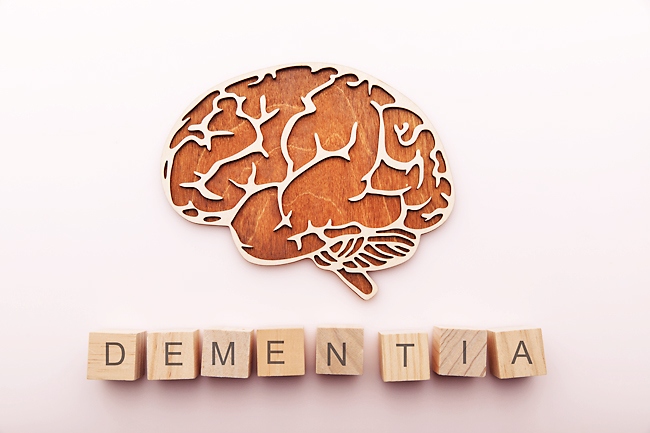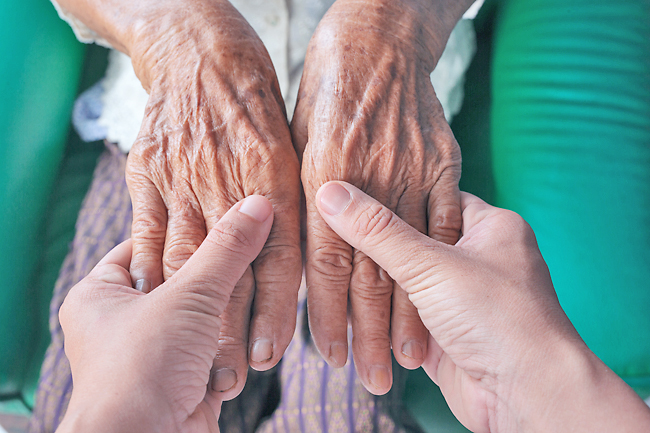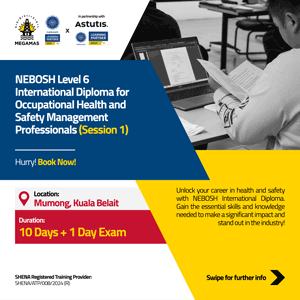Contributed by Elizar Simarak, Azizi Haji Alidin & Nursaniah Haji Yusof
Dementia is a term used to describe a group of symptoms affecting memory, thinking, and social abilities that are severe enough to interfere with daily life.
There are several types of dementia, such as Alzheimer’s disease, vascular, Lewy body, fronto-temporal and alcohol-related dementia. The different types of dementia affect different parts of the brain in the early stages of the disease but eventually, as the dementia progresses, it becomes difficult to differentiate between the different subtypes.
The first dementia case described was of Alzheimer’s disease, named after Alois Alzheimer in 1906, a German psychiatrist who did a post-mortem on the brain of a person with dementia symptoms.
Dementia affects a person and their families, with an increasing burden of care when there is a need to help and do things for them. In Brunei, there are an estimated 1,500 people living with dementia, yet this condition is not well-known among the community.
We are third-year students from Universiti Brunei Darussalam (UBD) currently doing our Community Outreach Programme (COP) with Demensia Brunei. We want to raise public awareness as dementia is not well known and is commonly misunderstood by the community. We would like to encourage the development of clinical and support services and a dementia-friendly community. People with dementia need to be engaged with, which will be discussed in this article.


PURPOSE OF ENGAGEMENT
Why is engagement vital for people with dementia? According to mental stimulation and cognitive health, participating in activities that engage the brain is crucial for those living with dementia. Researchers have found that doing lots of activities can slow down the progression of dementia and improve their cognitive functioning over a period of time.
Engagement is important for everyone but more important for people living with dementia, as the activities can be meaningful to them, help them feel positive, supported and give purpose to their lives. Some people with dementia think they are useless and cannot do anything by themselves. This is where our support is most needed.
There are several ways to engage people with dementia, such as engaging in a one-on-one conversation with minimal distractions. This helps them to be more open and relaxed. Speak slowly and clearly as some of them take time to answer questions. Give them time to respond and do not ask too many questions in one go. The most important thing is to be more patient and offer reassurance.
IDEAL ACTIVITIES FOR PEOPLE LIVING WITH DEMENTIA
There are many activities that can keep people living with dementia engaged. Here are a few of them:
Cooking and baking
The five basic senses of sight, sound, smell, taste, and touch are often taken for granted.
However, with dementia, the loss of basic senses presents a challenge. Tactile activities allow participants to experience a variety of textures and hand-eye coordination. The sounds, the aroma of food, and the most favourite of all, taste, stimulate the senses. Cooking and baking together with other people also encourage socialisation.
Listening to songs and/or singing along
Familiar music may evoke previously lost memories of childhood, friends, and immediate recall of short stories. Research has shown that music can aid with depression, anxiety, and overall stress. On top of that, many people with dementia do not feel their voice is heard. So, singing provides an immediate sense of self-worth if they can sing and have others notice and respond.
Gardening
Whether it is planting new blooms in pots or picking and harvesting fruits and vegetables, gardening can stimulate an increase in their attention span. This can then be transferred to other tasks that they may have difficulty with, such as sitting down to eat or reading a book.
People with dementia may develop feelings of loneliness, frustration, low mood and a loss of a sense of purpose. Gardening can give a sense of encouragement, accomplishment and purpose through these horticultural activities. Moreover, within the garden, they can socialise with others while they work, which also helps them develop new knowledge and skills.
Taking a walk
Taking a walk or a wheelchair excursion is a great way to think about directions and places for people with dementia. However, it may be better not to go too far to avoid confusion.
Walking also helps them to work off the restless urge to wander, which is typical for people with dementia.
Reminiscence work
Sharing life experiences and stories from the past with photos, familiar objects, videos and music clips can be done through books, tablets or other digital devices. This can assist people with dementia to reminisce about pleasant times. It can also assist them to remember the people in their lives.
IDEAL ENVIRONMENT FOR DEMENTIA PATIENTS
The environment plays a vital role in contributing to the effectiveness of engagement with people living with dementia. As dementia progresses, the person depends more on the environment to give cues. This is because when the ability to process information becomes more impaired, a person depends on more environmental clues to tell them what is happening. We can create an ideal environment for more effective engagement with those with dementia by taking this fact into account.
Safe and consistent environment
Difficulty in environment perception is common for people with dementia. They need the environment to be predictable and constant. Changing the furniture around may result in disorientation, making them feel agitated and confused. This also leads them to be vulnerable to the risk of falling. Therefore, the environment must ideally be simple, free of patterns with minimalist furniture arrangements and decorations. This will reduce disorientation and confusion, and improve their safety.
Draw on past experiences
When planning activities for people with dementia, it is important to know their former lifestyle, work history, hobbies, recreational and social interests, past travel experiences and significant life events. These can help plan activities that can re-establish their old roles and use their skills. This increases the likelihood that they find the activities fun and stimulating, as they had past experiences in performing these tasks.
Choose times that suit a person’s level of functioning
It is important to note the person’s preferred time to do activities. Some people may not have the mood to do activities at a particular day or time. This mood may affect the ambiance, environment and the mood of other people. To achieve the best environment to do activities, it is a must to ensure that everyone is at their best so they can focus and dedicate themselves to the planned activities.
Bring your skills to the activity
Family members who engage in activities with those with dementia will have to share and show their skills with the intention of guiding them. For people with dementia, they can make use of skills that have not been forgotten, such as washing clothes, cooking and other house chores. We should create a learning environment for people with dementia and encourage them to take responsibilities in some activities. This helps them feel more useful, as they can contribute to the household.
VALUE OF ENGAGEMENT
The more effectively we can engage people with dementia, the more meaningful it becomes. By engaging with them, we interact with them, which means we listen to what they want to say. Listening or talking to them helps, and means that we view them as our equal.
People with dementia tend to isolate themselves from social gatherings or interactions with others, as they feel unable to initiate a conversation or an activity themselves. When no one else does anything to engage their attention, the person has no choice but to retreat into their own thoughts. More engagement with people means that we are reducing the risk of them becoming more withdrawn.
Participating in engagement activities helps people with dementia feel better about themselves, support their well-being and independence as well as give purpose to their lives.
As they engage in more activities, they learn the necessary skills for daily life routines and activities. This encourages them to take care of themselves and makes them feel that they can contribute.
They may also find new passions and hobbies while engaging in the activities planned for them. Most importantly, this will increase their self-esteem and sense of accomplishment, resulting in more confidence in themselves.
It is important to raise the public’s awareness of engaging activities for people with dementia.
In a dementia friendly community, there is a need and an opportunity to create more programmes to accommodate people living with dementia, including workshops, social media campaigns, press conferences and public events.






